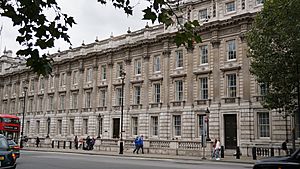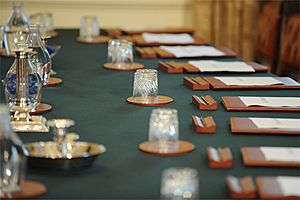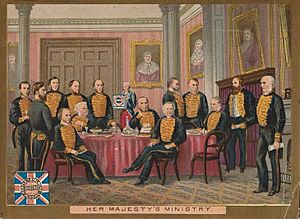Cabinet of the United Kingdom facts for kids
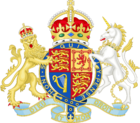
Royal Arms of His Majesty's Government
|
|
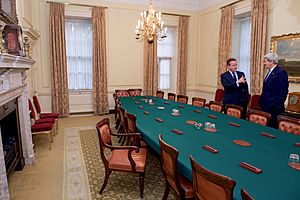 Cabinet Room, 10 Downing Street |
|
| Cabinet overview | |
|---|---|
| Formed | 1644 |
| Type | Committee of the Privy Council |
| Jurisdiction | United Kingdom |
| Headquarters | Cabinet Room, 10 Downing Street |
The Cabinet of the United Kingdom is a very important group of senior leaders in the Government of the United Kingdom. Think of it as the main team that makes big decisions for the country. The Prime Minister leads this team. Its members are usually chosen from people who work in the Parliament of the United Kingdom, either the House of Commons or the House of Lords. These members are called Secretaries of State and other senior Ministers.
The Cabinet's main job is to discuss and decide on big issues that affect everyone in the country. They also sort out disagreements between different government departments. Another group, called the Shadow Cabinet, watches what the Cabinet does very closely. This Shadow Cabinet is made up of members from the main political party that is not in power.
Contents
The Cabinet's Story: How it Began
Early Days of Royal Advice
For a long time, back in the 1500s, kings and queens in England had many different officials. Each official had their own job and powers. The king or queen and a group called the Privy Council were the only ones who brought everyone together. People started using phrases like "cabinet counsel" in the late 1500s. This meant private advice given to the monarch in a small, private room, often called a "cabinet."
Kings and Advisors
King Charles I started a more formal "Cabinet Council" in 1625. This was like his private group of advisors. The word "cabinet" by itself was first used for this group in 1644. Later, after England and Scotland joined together in 1707, the Cabinet became the main group running the British government. This happened especially during the time of King George I and King George II. They weren't native English speakers and didn't know British politics well. So, they relied a lot on a chosen group of advisors.
The Modern Cabinet Takes Shape
The way the Cabinet works today was mostly set up by Prime Minister David Lloyd George between 1916 and 1922. He created the Cabinet Office to help organize meetings and keep records. This change was very important during the First World War. The government needed to make quick and coordinated decisions about things like getting soldiers and making weapons. A smaller "War Cabinet" helped manage the war effort.
Who is in the Cabinet?
Choosing the Team
The Prime Minister gets to choose who is in the Cabinet. Most Cabinet members are also members of Parliament. This means they are either in the House of Commons or the House of Lords. This tradition helps make sure that the government is connected to the people's representatives.
Important Roles and Rules
There's a limit to how many Cabinet ministers can get a salary, usually around 21, plus the Lord Chancellor. Some other important people, like the Attorney General (who gives legal advice), might attend meetings. However, they usually don't join in the discussions. This helps them stay neutral when giving legal opinions.
Support Staff
Even though they don't vote or discuss, other people attend Cabinet meetings. These include civil servants from the Cabinet Office. They help organize everything and keep records. Also, special advisors to the Prime Minister might be there.
Cabinet Meetings
Where and When They Meet
Most Cabinet meetings happen in a special room called the Cabinet Room at 10 Downing Street in London. This is the official home and office of the Prime Minister. Sometimes, meetings have happened in other places too.
Historically, Cabinet meetings often took place on Thursdays. However, different Prime Ministers have changed this. For example, Gordon Brown and Theresa May held their meetings on Tuesdays. David Cameron brought them back to Thursdays during his time.
How Meetings Work
The length of meetings can change a lot. It depends on the Prime Minister's style and what's happening in the country. Modern meetings can sometimes be quite short, lasting only about 30 minutes. All ministers in the Cabinet must follow a rule called "collective ministerial responsibility." This means that once the Cabinet makes a decision, all ministers must support it publicly, even if they disagreed with it in private. It's like a team agreeing to stick together.
Why the Cabinet is Important
The Prime Minister's Role
The Prime Minister leads the Cabinet and has a lot of power. They choose who becomes a Cabinet minister and can also remove them. The Prime Minister also decides what each minister and their department will be responsible for. While the Prime Minister used to be seen as "first among equals" (meaning just one of the important people), today they are clearly the main leader of the government.
Making Big Decisions
The Cabinet is the top group for making decisions in the government. It's where the most important choices about how the country is run are made. In the past, people like Walter Bagehot described the Cabinet as the "efficient secret" of the British political system. This meant it was the key to how things really got done.
How Power Has Changed
Over time, the power of the Prime Minister has grown. Leaders like David Lloyd George, Stanley Baldwin, and Winston Churchill became very strong figures. Some people think that the Prime Minister now has even more power than the Cabinet as a whole. This is sometimes because Prime Ministers have their own small group of trusted advisors, often called a "kitchen cabinet." These advisors might help make big decisions even before the full Cabinet meets.
Working Together
The amount of power a Prime Minister has can depend on many things. It depends on how much support they have from their political party. If a party is divided, the Prime Minister might need to include different powerful members in the Cabinet to keep everyone working together. Also, if the government is a coalition (two parties working together), the Prime Minister's power might be shared more.
Meet the Current Cabinet
As of September 5, 2025, the Cabinet is led by Prime Minister Keir Starmer. This is his second Cabinet, formed after the General Election in 2024. Below are the people who are currently part of this important team.
Starmer ministry |
||||
| Minister |
Office(s) | Department | Took office | |
|---|---|---|---|---|
| Cabinet Ministers | ||||
 |
Sir Keir Starmer MP for Holborn and St Pancras |
Prime Minister First Lord of the Treasury |
Cabinet Office | 5 July 2024 |
 |
David Lammy MP for Tottenham |
Deputy Prime Minister | Cabinet Office | 5 September 2025 |
| Lord Chancellor Secretary of State for Justice |
Ministry of Justice | |||
 |
Rachel Reeves MP for Leeds West and Pudsey |
Chancellor of the Exchequer Second Lord of the Treasury |
HM Treasury | 5 July 2024 |
 |
Shabana Mahmood MP for Birmingham Ladywood |
Secretary of State for the Home Department | Home Office | 5 September 2025 |
 |
Yvette Cooper MP for Pontefract, Castleford and Knottingley |
Secretary of State for Foreign, Commonwealth and Development Affairs | Foreign, Commonwealth and Development Office | 5 September 2025 |
 |
John Healey MP for Rawmarsh and Conisbrough |
Secretary of State for Defence | Ministry of Defence | 5 July 2024 |
 |
Darren Jones MP for Bristol North West |
Chancellor of the Duchy of Lancaster | Cabinet Office | 5 September 2025 |
| Chief Secretary to the Prime Minister | 1 September 2025 | |||
 |
Steve Reed MP for Streatham and Croydon North |
Secretary of State for Housing, Communities and Local Government | Ministry of Housing, Communities and Local Government | 5 September 2025 |
 |
Pat McFadden MP for Wolverhampton South East |
Secretary of State for Work and Pensions Minister for Intergovernmental Relations |
Department for Work and Pensions | 5 September 2025 |
 |
Wes Streeting MP for Ilford North |
Secretary of State for Health and Social Care | Department of Health and Social Care | 5 July 2024 |
 |
Bridget Phillipson MP for Houghton and Sunderland South |
Secretary of State for Education Minister for Women and Equalities |
Department for Education | 5 July 2024 |
 |
Ed Miliband MP for Doncaster North |
Secretary of State for Energy Security and Net Zero | Department for Energy Security and Net Zero | 5 July 2024 |
 |
Liz Kendall MP for Leicester West |
Secretary of State for Science, Innovation and Technology | Department for Science, Innovation and Technology | 5 September 2025 |
 |
Peter Kyle MP for Hove and Portslade |
Secretary of State for Business and Trade |
Department for Business and Trade | 5 September 2025 |
 |
Heidi Alexander MP for Swindon South |
Secretary of State for Transport | Department for Transport | 29 November 2024 |
 |
Emma Reynolds MP for Wycombe |
Secretary of State for Environment, Food and Rural Affairs | Department for Environment, Food and Rural Affairs | 5 September 2025 |
 |
Lisa Nandy MP for Wigan |
Secretary of State for Culture, Media and Sport | Department for Culture, Media and Sport | 5 July 2024 |
 |
Hilary Benn MP for Leeds South |
Secretary of State for Northern Ireland | Northern Ireland Office | 5 July 2024 |
 |
Douglas Alexander MP for Lothian East |
Secretary of State for Scotland | Scotland Office | 5 September 2025 |
 |
Jo Stevens MP for Cardiff East |
Secretary of State for Wales | Wales Office | 5 July 2024 |
 |
Angela Smith, Baroness Smith of Basildon Life peer |
Leader of the House of Lords |
Office of the Leader of the House of Lords | 5 July 2024 |
| Ministers Who Also Attend Cabinet Meetings | ||||
 |
Sir Alan Campbell MP for Tynemouth |
Leader of the House of Commons |
Office of the Leader of the House of Commons | 5 September 2025 |
 |
Jonathan Reynolds MP for Stalybridge and Hyde |
Government Chief Whip Parliamentary Secretary to the Treasury |
HM Treasury | 5 September 2025 |
 |
James Murray MP for Ealing North |
Chief Secretary to the Treasury | HM Treasury | 1 September 2025 |
 |
Anna Turley MP for Redcar |
Minister without Portfolio | Cabinet Office | 6 September 2025 |
 |
Richard Hermer, Baron Hermer Life peer |
Attorney General for England and Wales Advocate General for Northern Ireland |
Attorney General's Office | 5 July 2024 |
 |
Jenny Chapman, Baroness Chapman of Darlington Life peer |
Minister of State for International Development, Latin America and Caribbean | Foreign, Commonwealth and Development Office | 28 February 2025 |
See also
 In Spanish: Gabinete del Reino Unido para niños
In Spanish: Gabinete del Reino Unido para niños
- British Government frontbench
- List of female cabinet members of the United Kingdom
- Official Opposition Shadow Cabinet
- United Kingdom cabinet committee
 | Valerie Thomas |
 | Frederick McKinley Jones |
 | George Edward Alcorn Jr. |
 | Thomas Mensah |


